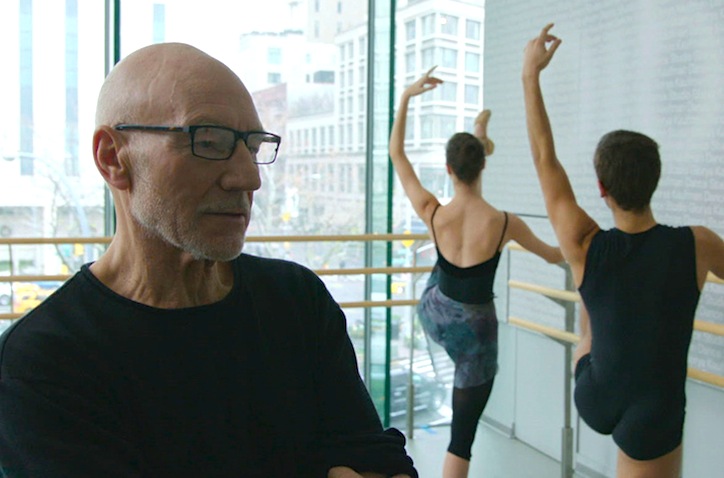 In the fitfully entertaining “Match,” Patrick Stewart is Tobi, an experienced dance instructor who has arrived in New York City after a whirlwind globe-trotting lifestyle. His days are spent working with students craving approval and attention, barking orders through his thick brogue. When he returns home, it is to solitude, to knitting and the occasional deli visit. Tobi is a child of the sixties, and his liberation during that period has allowed him a contemporary peace.
In the fitfully entertaining “Match,” Patrick Stewart is Tobi, an experienced dance instructor who has arrived in New York City after a whirlwind globe-trotting lifestyle. His days are spent working with students craving approval and attention, barking orders through his thick brogue. When he returns home, it is to solitude, to knitting and the occasional deli visit. Tobi is a child of the sixties, and his liberation during that period has allowed him a contemporary peace.
That peace is broken when Tobi accepts an offer for an interview with Lisa and Mike (Carla Gugino, Matthew Lillard). His restlessness is endearing, his social anxiety plucky and attractive. When he is joined by the duo at a diner, he exerts effort to make an off-color joke before profusely apologizing. Stewart’s performance is of a man who has constantly found time to self-analyze, thinking it’s the same as perceiving and understanding the needs of others. The question of sexuality hangs over the air during his dainty grooming techniques and extravagant physical gestures. Is he gay? It no longer really matters to Tobi, one way or the other. When this ostentatious old man orders a “party mix” for his guests in a diner of all places, it’s predictably adorable.
Lisa and Mike have less patience for this approach. She stresses that she’s focusing on a dissertation on Modern Dance, though she keeps revising that information. Mike is a bit different: he’s beyond reacting politely to Tobi’s long-winded, self-serving stories, and when he chimes in with his own questions, they’re clipped, direct, and confrontational. It’s a boon for the film that these two are able to corner Tobi in his own apartment, maximizing the secrets that are about to unfold. And it doesn’t take a detective to learn what’s really going to unravel.
 “Match” emerges from a Broadway play by Stephen Belber, here returning to write and direct. He doesn’t exactly open up the material visually, preferring straight-ahead set-ups and close-ups. When intense physical activity occurs, Belber smartly minimizes camera staging by zooming the camera into the performers, who are more than up to the task. Unfortunately, Belber’s direction would easily inspire those not familiar with the source material to deduce 1) This is most certainly based on a play, and 2) Why was it filmed?
“Match” emerges from a Broadway play by Stephen Belber, here returning to write and direct. He doesn’t exactly open up the material visually, preferring straight-ahead set-ups and close-ups. When intense physical activity occurs, Belber smartly minimizes camera staging by zooming the camera into the performers, who are more than up to the task. Unfortunately, Belber’s direction would easily inspire those not familiar with the source material to deduce 1) This is most certainly based on a play, and 2) Why was it filmed?
The answer to that question is a good and practical one, and it comes in the form of Stewart. The experienced theater vet has been given material that allows him to preen, pontificate and laugh with glee. Stewart is a treasure, and it’s unfortunate he hasn’t been seen onscreen much lately: his every gesture and word is relished, like a hungry man biting into a bon-bon. Were there no conflict in this film, one could easily sit around all day and hear Stewart’s booming voice gleefully discuss the merits of fencing, cunnilingus and free-range chickens.
The characters of Mike and Lisa are a bit more streamlined, while it’s clear that the picture’s sympathies lie with Tobi, Gugino and Lillard won’t allow themselves to be cowed by Stewart’s bombast. A seemingly middle-class couple from Seattle, they nonetheless seem to have pretty straightforward Midwestern values. Lisa’s compassion ultimately shifts into a lack of self-preservation too quickly, but Gugino brings a wounded beauty and grace to her performance. Lillard, meanwhile, has become something of a go-to guy for wounded, impotent everyman schlubs. His tight, conservative mustache almost feels like a badge.
But this is Stewart’s show, and it’s a dynamite role for anyone, never mind the screen’s beloved Professor Xavier. The actor slips away and Tobi ultimately dominates the screen to the point where you lose track of the film proper and become Tobi’s guest. It’s rare to see this level of comfort between an actor and a character, and he’s just as watchable shrinking from pain as he is telling a joke or yelling profanities. “Match” is ultimately about the sins of the past that come to roost in the modern world, and you can’t illustrate that without an actor who can’t seem delightfully happy to be anywhere. An amusing anecdote seems like a throwaway line, but it reverberates through the piece, as Tobi discusses meeting, and showing disdain for, Saddam Hussein. One gets the vibe that it was a meeting between two like minds, if not in cruelty, than in self-interest. [B]
This is a reprint of our review from the 2014 Tribeca Film Festival.

